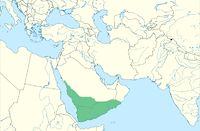Arabian cobra: Difference between revisions
imported>John Stephenson m (image is a possible copyvio) |
mNo edit summary |
||
| Line 54: | Line 54: | ||
<div class="references-small"> | <div class="references-small"> | ||
<references/> | <references/> | ||
</div> | </div>[[Category:Suggestion Bot Tag]] | ||
Latest revision as of 06:00, 12 July 2024
| Arabian cobra | ||||||||||||||||||||
|---|---|---|---|---|---|---|---|---|---|---|---|---|---|---|---|---|---|---|---|---|
| Scientific classification | ||||||||||||||||||||
| ||||||||||||||||||||
| Binomial name | ||||||||||||||||||||
| Naja arabica Scortecci, 1932[1][2][3] | ||||||||||||||||||||
 Distribution of the Arabian cobra
| ||||||||||||||||||||
| Synonyms | ||||||||||||||||||||
|
The Arabian cobra (Naja arabica) is a species of cobra in the genus Naja that is found in the Arabian Peninsula. This species had long been considered to be a subspecies of the Egyptian cobra (Naja haje), but morphological and genetic differences have led to its recognition as a separate species.[4]
Etymology
This species was first described by Scortecci in 1932. The generic name naja is a Latinisation of the Sanskrit word nāgá (नाग) meaning "cobra". The specific epithet arabica means "arabic" or "of Arab lands".
Description
It is a medium to large, slightly depressed, tapered and moderately slender bodied snake with a medium length tail. Body compressed dorsoventrally and subcylindrical posteriorly. Has long cervical ribs capable of expansion to form a hood when threatened. Measures roughly 1 m (3.28 ft) to 1.5 m (4.92 ft) in length, but may grow to lengths of 2.4 m (7.87 ft). The head is broad, flattened and slightly distinct from the neck. The canthus is distinct. The snout is rounded. The eyes are medium in size with round pupils. Dorsal scales are smooth and strongly oblique. Dorsal scale count (21 or 23) - (19 or 21, very rarely 17) - (15 or 17).[5]
Distribution and habitat
The Arabian cobra is found in the Arabian Peninsula. It occurs in southeastern Saudi Arabia, throughout Yemen and eastern Oman.
This species is most often found in well vegetated microhabitats within close proximity to water in rocky, arid, semi desert regions.[5]
Behaviour and diet
Behaviour
Apparently this species is a "spitter". It is mainly diurnal, often forages during the day on overcast days. If confronted, it will raise its forebody, spread its hood and readily spit (squirts) venom at the eyes of an intruder or aggressor. Seldom bites.[5]
Diet
This species prefers to prey upon frogs and toads but will eat small mammals, birds, eggs, lizards and other snakes as well.[5]
Cited references
- ↑ Naja arabica SCORTECCI, 1932 at The Reptile Database. Accessed 22 May 2012.
- ↑ Naja arabica at UniProtKB. Accessed 22 May 2012.
- ↑ Naja arabica at National Center for Biotechnology Information (NCBI). Accessed 22 May 2012.
- ↑ Trape, Jean-François. Phylogeography and systematic revision of the Egyptian cobra (Serpentes: Elapidae: Naja haje) species complex, with the description of a new species from West Africa. Zootaxa. Magnolia Press. Retrieved on 22 May 2012.
- ↑ 5.0 5.1 5.2 5.3 Arabian cobra at Clinical Toxinology. Accessed 22 May 2012.